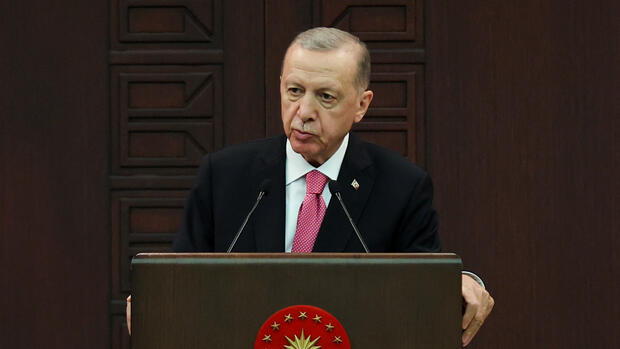Istanbul Turkish President Recep Tayyip Erdogan has appointed a finance executive from the United States to head Turkey’s central bank. Hafize Gaye Erkan’s nomination was published in the Official Gazette on Friday. Erkan takes office less than a week after the president signaled a departure from unconventional fiscal policies with a new cabinet.
The former co-CEO of First Republic Bank and a managing director at Goldman Sachs must now restructure fiscal policy after years of interest rate cuts and an ongoing economic crisis. As the fifth head of the central bank in four years, she replaces Sahap Kavcioglu, who implemented Erdogan’s interest rate cut policy and has now been appointed head of the state banking regulator BDDK.
The First Republic Bank recently faced an existential crisis and was taken over by JP Morgan Chase in a bailout. Now the 41-year-old has to take responsibility herself in a rescue operation. The Turkish lira is currently rushing from record low to record low and has lost more than eleven percent against the US dollar this week alone. On Friday morning (local time) one dollar cost 23.48 lira. For comparison: a year ago it was a good 17 lira, five years ago 4.8 lira.
Analysts see Erkan’s appointment as a sign of a possible normalization of Turkey’s monetary policy after years of extremely low borrowing costs. Nick Stadtmiller from the analysis house Medley Global Advisors emphasized in an interview with the news agency Bloomberg that her success will also depend on how much political autonomy she will enjoy under Erdogan. “The open question is whether Erdogan will allow the central bank to raise interest rates enough to lower inflation.” Higher interest rates would make the lira more attractive as an investment currency and demand would increase accordingly.
PhD within a year
Turkey had hitherto followed a comparatively unusual economic course. The central bank lowered interest rates instead of raising them in the fight against extremely high inflation. Most recently, inflation was still just under 40 percent despite a decline. At the top, up to 85 percent were marked last year.
However, Erdogan describes himself as a “interest enemy”. He wants to boost the economy with cheap money. As a result, the lira depreciated drastically. At the same time, Erdogan supported the national currency by selling state dollar reserves and using them to buy lira.
With wages and salaries rising at the same time, the purchasing power of Turks abroad increased. The result: many people and companies bought imported goods. As a result, the country’s trade deficit skyrocketed. Experts warn that if current policies continue, the economy is heading for turbulence as its foreign exchange reserves will soon be exhausted.
Experts warn that the Turkish economy is headed for turbulence if current policies continue.
(Photo: AP)
The new Finance Minister Mehmet Simsek announced that he would return to a rational monetary policy. According to Tatha Ghose from Commerzbank, a new central bank governor and “a few small interest rate hikes and a move away from (soft) capital controls are not enough”. Ghose says: “Such measures will only stop the damage that has been caused on a daily basis over the past few years.”
The new central bank governor faces a tough task, but Erkan has an unparalleled resume. In her native Istanbul, the daughter of an engineer and a maths teacher graduated from the renowned Istanbul Erkek Lisesi high school as the second best in her year. She finished her studies in industrial engineering at the Turkish elite university Bogazici with the best.
She completed a doctoral degree at Princeton University in the US, which normally lasts two years, within a year – making it the first in the university’s 276-year history. She was subsequently named the youngest professor in the United States.
Statements only on the world economy
After research stays at Stanford and Harvard, she worked for Goldman Sachs for nine years before moving to Bank First Republic in 2014 as head of investments. There, she increased the value of the funds managed by the bank tenfold and was the only woman under 40 to head one of America’s 100 major banks. In May of this year, the bank was acquired by the US Deposit Insurance Fund and sold to JPMorgan in the third major bank failure of the year.
What is striking: Erkan regularly writes guest articles in the Turkish business newspaper Dünya. In it she never commented on the Turkish economy, but did express her views on the world economy. In her most recent contribution from May 31, she blames negative real interest rates, i.e. the difference between inflation and key interest rates, for “global macroeconomic challenges”.
Together with geopolitical developments such as the Ukraine war and high energy prices, this is leading to “a shift in the balance of power from users to investors”. Erkan sees an “acceleration of de-dollarization” in view of the strategy of some emerging countries, such as Russia and recently Indonesia, to largely do without the dollar in their imports and exports.
With agency material.
More: Turkey nears ratification of Sweden’s NATO bid
